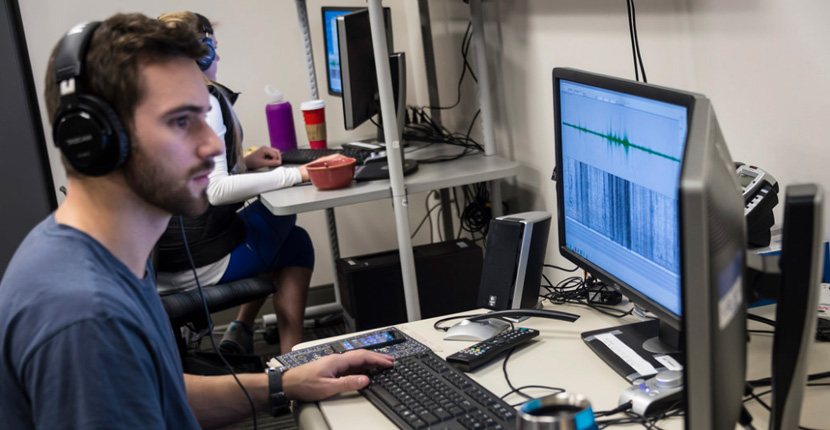
Speech Research
Acoustic and Physiological Phonetics
This focus area, directed by Eugene H. Buder, Ph.D., supports research on the nature of sound signals used for communication and the mechanisms that produce them. A broad range of topics may be investigated in this area. Topics include respiratory and laryngeal movements for speech production; normal and pathological voice qualities; variations in speech segments associated with infant and child development, motor speech disorders, phonological patterns, or second-language acquisition; emotional expression; animal vocalizations. Many other faculty members participate in this focus area and facilities that support these topics include the Speech Science Lab, the Phonetics Lab, and the Clinical Instrumentation Station.
Adult Neurogenic Communication Disorders Laboratory
Directed by Lynda Feenaughty, Ph.D., the Adult Neurogenic Communication Disorders Laboratory is dedicated to research investigating the relationship between neuropsychological function and spoken language behaviors. These behaviors include speech motor control and language characteristics and their perceived speech adequacy secondary to neurodegenerative disease such as Multiple Sclerosis (MS).
Cognition, Language, and Speech Laboratory
Directed by Naomi Eichorn, Ph.D., the Cognition, Language, and Speech Laboratory focuses on how cognitive processes, such as attention and memory, interact with speech and language functions. Current research in the lab examines contributions of attention to the occurrence of speech disfluencies and the implications of this relationship for the development and persistence of stuttering.
Origin of Language Laboratory
Directed by D. Kimbrough Oller, Ph.D. and Eugene H. Buder, Ph.D., the Origin of Language Laboratory is dedicated to research in infant vocal development and young child phonology. The laboratory continues a line of work that Dr. Oller has pursued for over 30 years under numerous funding sources. These sources include the National Institutes of Deafness and other Communication Disorders, the National Institutes of Child Health and Human Development, and the National Institutes of Mental Health. Private sources of funding for the IVOC lab include the Plough Foundation. The laboratory is co-directed by Dr. Buder and is also used by Dr. Linda Jarmulowicz.
Social Interaction Laboratory
The Social Interaction Laboratory, directed by Eugene H. Buder, Ph.D, is a specialized facility designed to support this focus area by acquiring video, audio, and physiological data from two persons engaged in conversation. The lab currently supports research in conversational management by persons with aphasia and persons who stutter, as well as collaborations in the areas of social psychology and discourse analysis. Dr. Buder's particular interest is in understanding how the dynamics of rhythmic and melodic aspects of speech behaviors support communicative coordination.
Voice, Emotion, and Cognition Laboratory
The Voice Emotion and Cognition Laboratory directed by Miriam van Mersbergen, Ph.D., CCC-SLP uses a multidimensional approach to investigating how emotional experience and cognitive factors influence vocalization and communication. Research approaches using psychometric investigations, affective and cognitive behavioral responses, psychophysiological reactions, event-related potentials, and speech/voice measures are combined to investigate the complex relation between our inner experiences and outer expression of those experiences. Current projects include establishing reliable vocal measures of affect modulation, investigating individual differences in response to vocal mistakes, and the establishment of measures of vocal effort. Applications of this research have the potential to inform clinicians on how to adapt vocal treatments to accommodate an individual's cognitive load and temperamental style.

